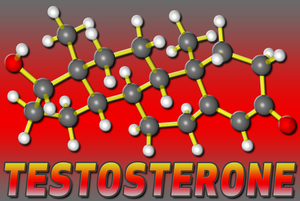Introduction
Recent studies have begun to shed light on the intricate relationship between testosterone levels and overall health in American men. One area of particular interest is the impact of low testosterone on liver health. A prospective study titled "Low Testosterone and Its Impact on Liver Health in American Men: A Prospective Study with Liver Function and Imaging Assessments" has provided valuable insights into this connection. This article delves into the findings of this study, exploring how low testosterone levels may influence liver function and the implications for men's health.
Understanding Low Testosterone
Testosterone, the primary male sex hormone, plays a crucial role in various bodily functions, including muscle mass, bone density, and sexual health. Low testosterone, or hypogonadism, is a condition where the body does not produce enough testosterone. This can lead to a range of symptoms, including fatigue, reduced libido, and mood changes. Recent research has also suggested a potential link between low testosterone and liver health.
The Study's Methodology
The study in question involved a cohort of American men aged 40 to 70, who were assessed for testosterone levels and liver health. Liver function was evaluated through blood tests measuring levels of liver enzymes such as alanine aminotransferase (ALT) and aspartate aminotransferase (AST). Additionally, liver imaging using ultrasound and magnetic resonance imaging (MRI) was conducted to assess liver fat content and any signs of liver disease.
Findings on Liver Function
The study found that men with lower testosterone levels had significantly higher levels of liver enzymes, indicating potential liver dysfunction. Specifically, the data showed a correlation between low testosterone and elevated ALT and AST levels, which are markers of liver damage. This suggests that low testosterone may contribute to liver inflammation and injury.
Liver Fat Accumulation and Low Testosterone
Another critical finding was the association between low testosterone and increased liver fat accumulation. The imaging assessments revealed that men with lower testosterone levels had a higher prevalence of hepatic steatosis, commonly known as fatty liver disease. This condition is characterized by the accumulation of fat in liver cells and can progress to more severe liver diseases if left untreated.
Implications for Men's Health
The implications of these findings are significant for American men's health. Low testosterone may not only affect traditional symptoms such as reduced energy and sexual function but also play a role in the development of liver disease. This underscores the importance of monitoring testosterone levels and liver health, particularly in middle-aged and older men who are at higher risk for both conditions.
Potential Mechanisms
The study also explored potential mechanisms linking low testosterone to liver health. One theory is that testosterone may have a protective effect on the liver, reducing inflammation and fat accumulation. Another possibility is that low testosterone could be a marker of overall metabolic health, which in turn affects liver function. Further research is needed to fully understand these mechanisms and develop targeted interventions.
Clinical Recommendations
Based on these findings, healthcare providers may consider screening men with low testosterone for liver health issues. Regular monitoring of liver enzymes and imaging assessments could help identify early signs of liver disease and guide appropriate treatment. Additionally, addressing low testosterone through hormone replacement therapy or lifestyle changes may have dual benefits for both testosterone levels and liver health.
Conclusion
The prospective study on low testosterone and its impact on liver health in American men provides compelling evidence of a significant association between the two. As men's health continues to be a focal point of medical research, understanding the interplay between testosterone and liver function is crucial. By recognizing the potential risks and taking proactive steps, American men can better manage their health and prevent the progression of liver disease.
Contact Us Today For A Free Consultation

- Environmental Toxins and Testosterone: Impacts and Mitigation Strategies for American Men [Last Updated On: March 9th, 2025] [Originally Added On: March 9th, 2025]
- Low Testosterone in American Males: Symptoms, Causes, and Treatment Options [Last Updated On: March 16th, 2025] [Originally Added On: March 16th, 2025]
- Low Testosterone's Impact on Muscle Mass and Strength in American Males [Last Updated On: March 16th, 2025] [Originally Added On: March 16th, 2025]
- Vitamin D's Role in Managing Low Testosterone in American Men: A Comprehensive Review [Last Updated On: March 16th, 2025] [Originally Added On: March 16th, 2025]
- Chronic Illness Impact on Low Testosterone in American Males: Management Strategies [Last Updated On: March 18th, 2025] [Originally Added On: March 18th, 2025]
- Managing Low Testosterone in Aging Men: Symptoms, Treatments, and Lifestyle Strategies [Last Updated On: March 18th, 2025] [Originally Added On: March 18th, 2025]
- Economic Burden of Low Testosterone on American Healthcare System [Last Updated On: March 19th, 2025] [Originally Added On: March 19th, 2025]
- Low Testosterone and Diabetes: Dual Challenges Impacting American Men's Health [Last Updated On: March 19th, 2025] [Originally Added On: March 19th, 2025]
- Alcohol Consumption and Its Impact on Testosterone Levels in American Men [Last Updated On: March 19th, 2025] [Originally Added On: March 19th, 2025]
- Zinc's Role in Boosting Testosterone Levels in American Men: A Comprehensive Review [Last Updated On: March 20th, 2025] [Originally Added On: March 20th, 2025]
- Low Testosterone and Mood Disorders: Impact and Management in American Men [Last Updated On: March 21st, 2025] [Originally Added On: March 21st, 2025]
- Low Testosterone in American Men: Symptoms, Diagnosis, and Treatment Strategies [Last Updated On: March 21st, 2025] [Originally Added On: March 21st, 2025]
- Smoking's Impact on Testosterone Levels in American Men: Risks and Recovery [Last Updated On: March 21st, 2025] [Originally Added On: March 21st, 2025]
- Low Testosterone's Impact on Osteoporosis Risk in American Men: Detection and Management [Last Updated On: March 22nd, 2025] [Originally Added On: March 22nd, 2025]
- Low Testosterone and Prostate Health: Risks, Therapy, and Management Strategies [Last Updated On: March 22nd, 2025] [Originally Added On: March 22nd, 2025]
- Low Testosterone and Hair Loss: Understanding the Link and Management Strategies [Last Updated On: March 22nd, 2025] [Originally Added On: March 22nd, 2025]
- Low Testosterone's Impact on Cognitive Function in American Men: Insights and Interventions [Last Updated On: March 22nd, 2025] [Originally Added On: March 22nd, 2025]
- Shift Work's Impact on Testosterone Levels in American Men: Health Implications and Mitigation [Last Updated On: March 22nd, 2025] [Originally Added On: March 22nd, 2025]
- Low Testosterone's Impact on Immune Health in American Males: Insights and Management [Last Updated On: March 23rd, 2025] [Originally Added On: March 23rd, 2025]
- Optimizing Testosterone Levels: Dietary Strategies for American Men [Last Updated On: March 23rd, 2025] [Originally Added On: March 23rd, 2025]
- Low Testosterone in American Men: Symptoms, Impact, and Treatment Options [Last Updated On: March 23rd, 2025] [Originally Added On: March 23rd, 2025]
- Environmental Estrogens: A Hidden Cause of Low Testosterone in American Males [Last Updated On: March 23rd, 2025] [Originally Added On: March 23rd, 2025]
- Low Testosterone's Impact on Skin Health in American Men: Causes and Management [Last Updated On: March 24th, 2025] [Originally Added On: March 24th, 2025]
- Weight Loss Boosts Testosterone: A Guide for American Males with Low T [Last Updated On: March 24th, 2025] [Originally Added On: March 24th, 2025]
- Herbal Supplements for Low Testosterone: Benefits, Limitations, and Efficacy in American Men [Last Updated On: March 24th, 2025] [Originally Added On: March 24th, 2025]
- Managing Low Testosterone in Aging Men: Symptoms, Treatments, and Lifestyle Strategies [Last Updated On: March 25th, 2025] [Originally Added On: March 25th, 2025]
- Low Testosterone and Heart Disease: Risks, Mechanisms, and Management in American Men [Last Updated On: March 25th, 2025] [Originally Added On: March 25th, 2025]
- Chronic Stress Impact on Testosterone Levels in American Men: Causes and Management Strategies [Last Updated On: March 25th, 2025] [Originally Added On: March 25th, 2025]
- Low Testosterone's Impact on Emotional Wellbeing in American Men: Insights and Guidance [Last Updated On: March 25th, 2025] [Originally Added On: March 25th, 2025]
- Low Testosterone and Depression: Understanding the Link and Its Impact on American Men [Last Updated On: March 25th, 2025] [Originally Added On: March 25th, 2025]
- Sleep Apnea's Impact on Testosterone Levels in American Males: Insights and Solutions [Last Updated On: March 25th, 2025] [Originally Added On: March 25th, 2025]
- Medications Impacting Testosterone Levels: Insights for American Men [Last Updated On: March 25th, 2025] [Originally Added On: March 25th, 2025]
- Low Testosterone and Metabolic Syndrome: Implications for American Men's Health [Last Updated On: March 25th, 2025] [Originally Added On: March 25th, 2025]
- Chronic Pain's Impact on Testosterone Levels in American Males: A Comprehensive Analysis [Last Updated On: March 26th, 2025] [Originally Added On: March 26th, 2025]
- Genetic Factors in Low Testosterone Among American Males: Insights and Implications [Last Updated On: March 26th, 2025] [Originally Added On: March 26th, 2025]
- Low Testosterone Linked to Increased Thyroid Disorder Risk in American Men [Last Updated On: March 26th, 2025] [Originally Added On: March 26th, 2025]
- Low Testosterone and Insulin Resistance: Exploring the Link in American Men [Last Updated On: March 26th, 2025] [Originally Added On: March 26th, 2025]
- Exercise Boosts Testosterone: A Guide for American Men [Last Updated On: March 26th, 2025] [Originally Added On: March 26th, 2025]
- Low Testosterone and Libido: Impacts, Diagnosis, and Treatment for American Men [Last Updated On: March 26th, 2025] [Originally Added On: March 26th, 2025]
- Low Testosterone's Impact on Body Composition in American Males: Challenges and Management [Last Updated On: March 27th, 2025] [Originally Added On: March 27th, 2025]
- Low Testosterone and Skin Health: Dermatological Impacts and Management in American Men [Last Updated On: March 27th, 2025] [Originally Added On: March 27th, 2025]
- Chronic Inflammation and Low Testosterone: Strategies for American Males [Last Updated On: March 27th, 2025] [Originally Added On: March 27th, 2025]
- Nutrition's Impact on Testosterone: Deficiencies and Dietary Solutions for American Males [Last Updated On: March 27th, 2025] [Originally Added On: March 27th, 2025]
- Respiratory Health's Impact on Testosterone Levels in American Males [Last Updated On: March 27th, 2025] [Originally Added On: March 27th, 2025]
- Testosterone's Role and Managing Low Levels in American Men [Last Updated On: March 28th, 2025] [Originally Added On: March 28th, 2025]
- Low Testosterone Linked to Anemia Risk in American Men: Insights and Management [Last Updated On: March 28th, 2025] [Originally Added On: March 28th, 2025]
- Low Testosterone Linked to Autoimmune Diseases in American Men: Insights and Management [Last Updated On: March 28th, 2025] [Originally Added On: March 28th, 2025]
- Liver Health Crucial for Testosterone Balance in American Males [Last Updated On: March 29th, 2025] [Originally Added On: March 29th, 2025]
- Gut Health and Testosterone: Optimizing Hormonal Balance in American Males [Last Updated On: March 29th, 2025] [Originally Added On: March 29th, 2025]
- Low Testosterone Linked to Increased Kidney Disease Risk in American Men [Last Updated On: March 30th, 2025] [Originally Added On: March 30th, 2025]
- Dental Health's Role in Managing Low Testosterone in American Males [Last Updated On: March 30th, 2025] [Originally Added On: March 30th, 2025]
- Low Testosterone Linked to Neurological Risks in American Men: Implications and Interventions [Last Updated On: March 30th, 2025] [Originally Added On: March 30th, 2025]
- Low Testosterone Linked to Increased Eye Disorder Risk in American Men [Last Updated On: April 1st, 2025] [Originally Added On: April 1st, 2025]
- Low Testosterone's Impact on Musculoskeletal Health in American Men: Risks and Interventions [Last Updated On: April 1st, 2025] [Originally Added On: April 1st, 2025]
- ENT Health's Crucial Role in Maintaining Testosterone Levels in American Men [Last Updated On: April 2nd, 2025] [Originally Added On: April 2nd, 2025]
- Reproductive Health's Impact on Testosterone Levels in American Males [Last Updated On: April 4th, 2025] [Originally Added On: April 4th, 2025]
- Low Testosterone Levels Increase Infectious Disease Risk in American Men: Emerging Evidence [Last Updated On: April 6th, 2025] [Originally Added On: April 6th, 2025]
- Low Testosterone and Hematological Risks in American Men: Screening and Treatment Insights [Last Updated On: April 7th, 2025] [Originally Added On: April 7th, 2025]
- Managing Low Testosterone: Endocrine Health and Holistic Approaches for American Males [Last Updated On: April 7th, 2025] [Originally Added On: April 7th, 2025]
- Immunological Health's Impact on Testosterone Levels in American Males: A Holistic Approach [Last Updated On: April 9th, 2025] [Originally Added On: April 9th, 2025]
- Cancer's Impact on Testosterone Levels in American Men: Challenges and Management [Last Updated On: April 9th, 2025] [Originally Added On: April 9th, 2025]
- Low Testosterone Linked to Increased Psychiatric Disorders in American Men: Implications and Treatments [Last Updated On: April 9th, 2025] [Originally Added On: April 9th, 2025]
- Low Testosterone and Urological Health: Risks, Links, and Management Strategies for American Men [Last Updated On: April 9th, 2025] [Originally Added On: April 9th, 2025]
- Testosterone Levels and Wound Healing in American Males: A Bidirectional Impact Study [Last Updated On: April 10th, 2025] [Originally Added On: April 10th, 2025]
- Low Testosterone Linked to Increased Vascular Disorder Risk in American Men [Last Updated On: April 12th, 2025] [Originally Added On: April 12th, 2025]
- Rheumatological Disorders and Low Testosterone: Insights and Management for American Males [Last Updated On: April 13th, 2025] [Originally Added On: April 13th, 2025]
- Low Testosterone's Impact on Surgical Risks in American Men: A Comprehensive Review [Last Updated On: April 13th, 2025] [Originally Added On: April 13th, 2025]
- Trauma's Impact on Testosterone Levels in American Males: Mechanisms and Management [Last Updated On: April 13th, 2025] [Originally Added On: April 13th, 2025]
- Low Testosterone and Genetic Disorders: Risks and Management in American Men [Last Updated On: April 15th, 2025] [Originally Added On: April 15th, 2025]
- Developmental Health Impacts on Testosterone Levels in American Males: A Comprehensive Analysis [Last Updated On: April 15th, 2025] [Originally Added On: April 15th, 2025]
- Low Testosterone in American Men Linked to Increased Congenital Disorder Risk in Offspring [Last Updated On: April 15th, 2025] [Originally Added On: April 15th, 2025]
- Low Testosterone in American Men Linked to Pediatric Disorders in Offspring [Last Updated On: April 16th, 2025] [Originally Added On: April 16th, 2025]
- Occupational Health Impacts on Testosterone Levels in American Males: A Comprehensive Analysis [Last Updated On: April 16th, 2025] [Originally Added On: April 16th, 2025]
- Low Testosterone Linked to Increased Allergic Reactions in American Men: Emerging Evidence [Last Updated On: April 17th, 2025] [Originally Added On: April 17th, 2025]
- Anesthetic Health and Its Impact on Low Testosterone in American Males [Last Updated On: April 18th, 2025] [Originally Added On: April 18th, 2025]
- Low Testosterone Risks in Aging American Men: Health Impacts and Management Strategies [Last Updated On: April 18th, 2025] [Originally Added On: April 18th, 2025]
- Neonatal Health's Long-term Impact on Testosterone Levels in American Males [Last Updated On: April 20th, 2025] [Originally Added On: April 20th, 2025]
- Prenatal Health's Impact on Adult Male Testosterone Levels and Management Strategies [Last Updated On: April 20th, 2025] [Originally Added On: April 20th, 2025]
- Managing Low Testosterone: Diagnosis, Treatment Options, and Lifestyle Strategies [Last Updated On: April 22nd, 2025] [Originally Added On: April 22nd, 2025]
- Low Testosterone Linked to Higher Type 2 Diabetes Risk in American Males [Last Updated On: April 22nd, 2025] [Originally Added On: April 22nd, 2025]
Word Count: 613




















